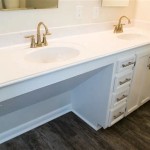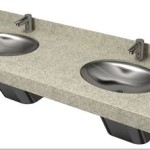How Long Does A Complete Bathroom Remodel Take?
Bathroom remodels, whether driven by necessity or a desire for aesthetic improvement, are complex projects with timelines that can vary considerably. Understanding the factors that influence the duration of a bathroom remodel is crucial for homeowners seeking to minimize disruption and manage expectations effectively. A complete remodel, involving significant alterations to layout, plumbing, electrical systems, and finishes, demands careful planning, skilled labor, and efficient project management. The following details the key elements that dictate the timeframe of such an undertaking.
The average timeframe for a complete bathroom remodel typically ranges from three to eight weeks. This is a broad estimate, and the actual duration can fluctuate based on the specifics of the project. Smaller, simpler bathroom updates, such as replacing a vanity or a toilet without altering plumbing, might take only a few days. Conversely, extensive renovations involving structural changes, custom installations, or unforeseen complications can extend the project timeline significantly. Therefore, a thorough assessment of the existing bathroom, a detailed design plan, and proactive communication with contractors are essential for estimating a more accurate completion date.
Scope of the Project and Design Complexity
The single most influential factor determining the duration of a bathroom remodel is the scope of the project. A project that involves simply replacing fixtures with similarly sized and positioned alternatives will naturally be shorter than one that entails moving walls, reconfiguring plumbing lines, or altering electrical wiring. The complexity of the design also plays a significant role. A straightforward, minimalist design with readily available materials will typically progress faster than a highly customized design featuring intricate tile work, bespoke cabinetry, and specialized fixtures.
Projects that require significant demolition are inherently more time-consuming. Removing existing tile, tearing down walls, and dismantling old plumbing fixtures all contribute to the initial phase of the remodel. The disposal of demolition debris also needs to be factored into the timeline. Furthermore, if the demolition process reveals unforeseen problems, such as water damage, mold, or outdated wiring, addressing these issues will inevitably add to the project's duration.
The complexity of the design directly impacts the labor hours required for installation. Custom cabinetry, for instance, requires precise measurements, fabrication, and installation, which can be a lengthy process. Intricate tile patterns, such as mosaics or herringbone designs, demand skilled craftsmanship and meticulous attention to detail, extending the tiling phase. Similarly, specialized fixtures, such as steam showers or whirlpool tubs, often require specialized installation techniques and may necessitate the involvement of multiple tradespeople.
The availability of desired materials is another factor influenced by design complexity. If the homeowner has selected unique or imported materials, the lead time for these items can significantly impact the overall project timeline. Ordering materials well in advance is crucial to avoid delays once the demolition phase is complete.
Contractor Availability and Scheduling
The availability and scheduling of contractors and other tradespeople is a critical determinant of the bathroom remodel timeline. A single contractor may manage all aspects of the project, or the homeowner may choose to hire individual tradespeople, such as plumbers, electricians, tile installers, and carpenters, separately. In either scenario, coordinating the schedules of these individuals is essential to ensure a smooth and efficient workflow. Delays in one area, such as plumbing, can cascade and impact the schedules of other tradespeople, ultimately extending the project's duration.
Before commencing the remodel, it is prudent to establish a clear project timeline with the contractor, outlining the sequence of tasks and the estimated duration of each phase. The timeline should also account for potential delays, such as material shortages or unforeseen complications. Regular communication with the contractor throughout the project is essential to monitor progress and address any issues that may arise.
The time of year can also affect contractor availability. Remodeling businesses tend to be busiest during the spring and summer months, making it more challenging to secure a contractor and potentially leading to longer lead times for scheduling. Off-season remodels, during the fall and winter, may offer greater flexibility in scheduling and potentially lower labor costs.
Furthermore, the experience and skill of the contractor significantly impact the project's duration. An experienced contractor will be more efficient in managing the project, coordinating tradespeople, and resolving any issues that may arise. A less experienced contractor may encounter unforeseen challenges, leading to delays and potentially compromising the quality of the work.
Permitting and Inspections
Depending on the scope of the bathroom remodel and local building codes, permits may be required before work can commence. Obtaining the necessary permits can add to the overall project timeline, as the process typically involves submitting architectural plans, paying fees, and undergoing inspections. The duration of the permitting process can vary depending on the local municipality and the complexity of the project.
It is essential to consult with the local building department or a qualified contractor to determine whether permits are required for the planned remodel. Applying for permits well in advance of the project start date is crucial to avoid delays. The permitting process often involves a review period during which the building department assesses the submitted plans to ensure compliance with building codes and regulations.
Once the permits are approved, inspections will be required at various stages of the remodel. These inspections are conducted by building inspectors to ensure that the work is being performed in accordance with the approved plans and building codes. Common inspections include plumbing, electrical, and framing inspections. Scheduling and completing these inspections can add to the project timeline, as inspectors may have limited availability, and any deficiencies identified during the inspection must be corrected before the project can proceed.
Failing to obtain the necessary permits or comply with building codes can result in significant penalties, including fines, stop-work orders, and the requirement to dismantle and reconstruct non-compliant work. Therefore, it is crucial to prioritize compliance with local building codes and regulations to ensure a smooth and legally compliant remodel.
In summary, estimating the duration of a complete bathroom remodel requires careful consideration of various factors. The scope of the project, the complexity of the design, contractor availability, scheduling, and the permitting process all play a significant role in determining the overall timeline. By thoroughly assessing these factors and maintaining open communication with contractors, homeowners can develop a realistic project timeline and minimize potential disruptions during the renovation process.
Accurate project planning is essential for a successful bathroom remodel. This begins with clearly defining the remodel's objectives and scope. Do you want a purely cosmetic upgrade, or does the project include moving walls and updating all the plumbing? The more detailed the planning stage, the better the chances of staying on time and within budget. This includes creating a mood board, selecting all fixtures, and deciding on a layout. It is recommended that homeowners spend a considerable amount of time considering all design aspects before commencing, as changes to the design mid-project will inevitably lead to delays and increased costs.
Choosing the right contractor further bolsters the chance for a timely and competent remodeling process. It is imperative to check references and verify their licenses and insurance. A contractor's experience and communication skills are just as important as their technical abilities. Regular communication and progress updates help homeowners track progress and address concerns promptly. Look for contractors who have a system for scheduling and communicating with different tradespeople.
Even with meticulous planning and a skilled contractor, unexpected challenges can still arise. Hidden plumbing issues, electrical problems, or unexpected structural damage can all throw a wrench into the schedule. Creating a contingency plan and budget for unforeseen problems can help mitigate potential delays and keep the project moving. Discuss possible issues with the contractor upfront and explore strategies to address them. Flexibility and adaptability are key to navigating the unpredictable nature of remodeling.

How Long Does A Bathroom Renovation Take Ac Remodeling

How Long Does A Bathroom Remodel Take 2024 Badeloft Usa

How Long Does A Bathroom Remodel Take Rolox Home Service Llc

2024 Guide Timeline Bathroom Remodeling Process

Length Of A Bathroom Remodel How Long Will Your Project Take

This Is How Long A Bathroom Remodel Takes To Complete In Atlanta

Start To Finish Just How Long Does It Take Remodel A Bathroom

Length Of A Bathroom Remodel How Long Will Your Project Take

How Long Does It Take To Remodel A Bathroom

How Long Does A Bathroom Renovation Take Ac Remodeling
Related Posts







